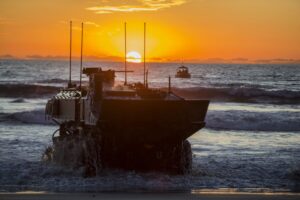BAE Systems said Monday the company has received a new $256.8 million full-rate production order for delivery of more Amphibious Combat Vehicles (ACV).
The latest deal, officially awarded on March 3, exercises a $145.3 million contract option for more than 25 base personnel ACVs and $111.5 million for more than 15 command and control variant vehicles, or ACV-Cs.

“The ACV is an extremely versatile platform that continues our commitment to equip the Marines with the vehicle to meet their expeditionary needs,” Garrett Lacaillade, BAE Systems’ vice president of amphibious programs, said in a statement. “Today, with our strategic partner Iveco Defence Vehicles, we are delivering this critical capability to the Marines. Together, we are working to introduce new and future capabilities into the ACV family of vehicles.”
BAE Systems has delivered more than 180 ACVs to the Marine Corps to date, according to the company.
The Marine Corps is pursuing a family of vehicles approach for ACV, which includes the base personnel platform and the ACV-C, along with a recovery variant (ACV-R) and a turreted variant called the ACV-30.
Both the base personnel and ACV-C are in full-rate production, with the Marine Corps having previously awarded BAE Systems an $89.5 million deal for delivery of 14 of the command and control vehicles last May.
Last March, the Marine Corps awarded BAE Systems a $34.9 million deal for design and development of the ACV-R followed by an $88 million deal in August to build several ACV-30s for testing (Defense Daily, Aug. 16 2022).
BAE Systems in May 2020 selected Kongsberg to provide its unmanned RT-20 medium caliber turret for the ACV-30 (Defense Daily, May 13 2020).
The Marine Corps has also previously tasked BAE Systems with integrating a suite of C4/unmanned aerial system capabilities onto an ACV to study if such a platform could meet the mission requirements for the future Advanced Reconnaissance Vehicle (ARV).
Last month, the Marine Corps said it officially started government testing with General Dynamics Land Systems [GD] and Textron Systems’ [TXT] ARV prototypes, with the results set to help inform whether to take the program into production (Defense Daily, Feb. 16).
“A third prototype, offered by BAE Systems, is also undergoing evaluation to provide the Marine Corps with trade space between a government off-the-shelf and purpose-built solution,” the Marine Corps said at the time.
BAE Systems said it delivered its ACV C4/UAS variant to the Marine Corps in January for testing.